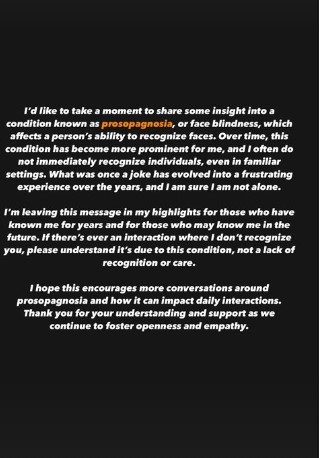In a heartfelt revelation, renowned Pakistani actress Ushna Shah has shared that she is battling a rare neurological disorder known as prosopagnosia, also called “face blindness,” which impairs her ability to recognize people’s faces. The actress opened up about her condition on her Instagram account, aiming to raise awareness about the often misunderstood disorder.
In an Instagram story, Ushna Shah disclosed her struggles with prosopagnosia, explaining how it has affected her daily interactions. “I want to draw attention to prosopagnosia, or face blindness, a condition where a person’s ability to recognize faces is impaired. This has increasingly become more apparent in my life,” she wrote.
Shah went on to describe the personal challenges she faces due to the disorder: “I often struggle to immediately recognize familiar faces, even those I know well. What used to be a light-hearted joke has now become a source of frustration and loss. I know I am not alone in this.”

To ensure that her friends, colleagues, and fans are aware of her condition, Shah has saved her message in the highlights of her Instagram profile. She hopes this step will prevent misunderstandings and provide insight to those who may interact with her in the future.
In addition to sharing her own experience, the actress urged for greater societal awareness regarding prosopagnosia, which is often overlooked or misunderstood.
What is Prosopagnosia?
According to the National Institutes of Health, prosopagnosia is a neurological disorder that makes it difficult for individuals to recognize even close family members or friends. The condition can range from mild to severe, with some individuals unable to recognize faces at all.
Harvard Medical School further describes face blindness as a mysterious condition that can lead to confusion, making individuals mistakenly believe they recognize someone they’ve never met, or fail to recognize those they are familiar with. While there is no cure for the condition, coping strategies often involve focusing on other cues like voices or distinctive physical features.
A recent study revealed that as many as one in 33 people (approximately 3.08%) may suffer from some form of prosopagnosia, indicating that the condition is more common than previously thought.
Ushna Shah’s decision to speak openly about her diagnosis not only sheds light on the struggles faced by those with prosopagnosia but also emphasizes the need for greater understanding and support for individuals coping with this disorder.














